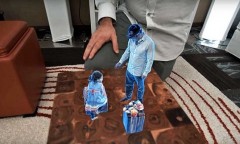By Steve Pak, | May 07, 2016

HoloFlex Smartphone
A new smartphone has been developed by Canadian researchers that they claim is the world's first holographic flexible smartphone. The phone's screen contains an array of lenses that are overlaid on one high-definition OLED screen. This allows people to view virtual reality images without 3D glasses, complicated projectors, or head tracking.
Like Us on Facebook
The smartphone was developed by researchers at the Human Media Lab of Queen's University. Its 1,920 x 1,080 HD screen allows multiple people to view 3D images at the same time, according to Engadget.
Researchers created the 3D effect by dividing the display screen into 16,000 12-pixel circles. Each small circle contains a miniscule fisheye lens that produces a different view of the 3D object on the handset's screen.
The phone's owners see a 1080-pixel display but after the image passes through the HoloFlex's lenses the result is a low-resolution of 160 x 104 pixels, according to The Verge. However, the 3D image can be seen from almost any angle.
The resolution will get clearer as smartphone tech improves. That will happen as pixel densities become smaller and manufacturing techniques improve, according to Gizmodo.
Meanwhile, the HoloFlex's display is bendable thanks to the integrated ReFlex display. It uses special sensors and haptic feedback to add a third dimension to the screen's gestures.
Smartphone owners can bend the device's screen to move objects forward or backward in order to adjust the VR image. Meanwhile, pairing the phone with a depth camera allows for Star Wars-like 3D video conferencing on Skype and other platforms.
The researchers have also developed a 3D version of Angry Birds as a demo application. Players can bend the flexible screen to pull back the virtual slingshot and launch the game's world-famous red bird.
In related news, Facebook's Oculus VR division is losing its display technology head Mary Lou Jepsen. She plans to resign from the social network giant in August to work on imaging tech for treating and curing diseases.
Jepsen shared she will be conducting work to shrink down MRI machines to wearable devices that could treat diseases such as cancer. She has also reportedly joined the board of directors of an auto company.
Earlier this year Oculus launched its Rift VR headset. In 2014 Facebook bought the startup company for $2 billion.
-
Use of Coronavirus Pandemic Drones Raises Privacy Concerns: Drones Spread Fear, Local Officials Say

-
Coronavirus Hampers The Delivery Of Lockheed Martin F-35 Stealth Fighters For 2020

-
Instagram Speeds Up Plans to Add Account Memorialization Feature Due to COVID-19 Deaths

-
NASA: Perseverance Plans to Bring 'Mars Rock' to Earth in 2031

-
600 Dead And 3,000 In The Hospital as Iranians Believed Drinking High-Concentrations of Alcohol Can Cure The Coronavirus

-
600 Dead And 3,000 In The Hospital as Iranians Believed Drinking High-Concentrations of Alcohol Can Cure The Coronavirus

-
COVID-19: Doctors, Nurses Use Virtual Reality to Learn New Skills in Treating Coronavirus Patients











